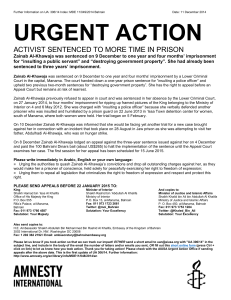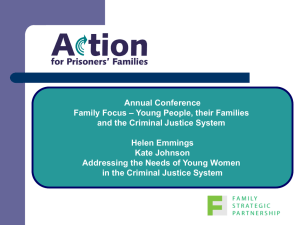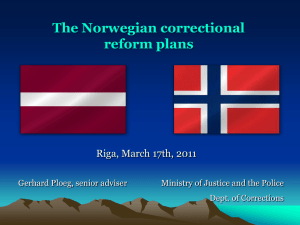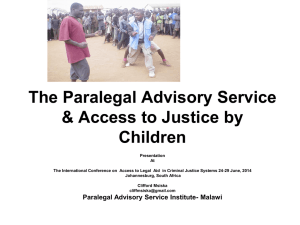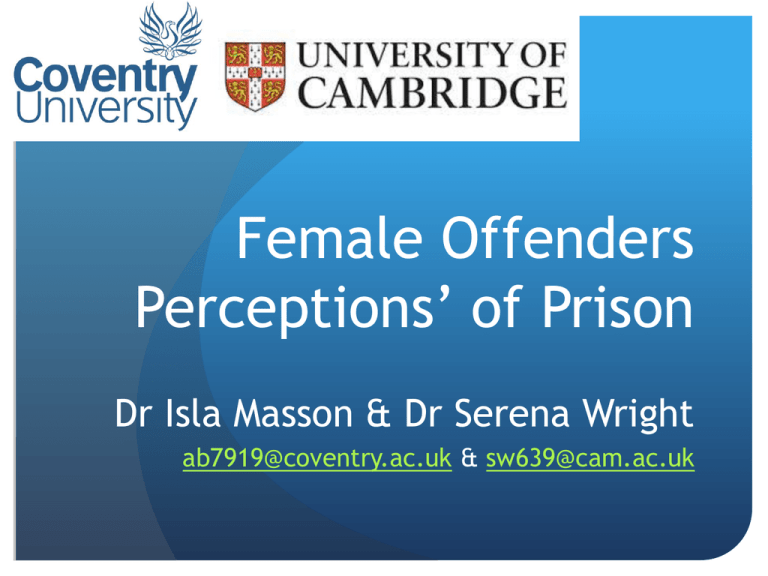
Female Offenders
Perceptions’ of Prison
Dr Isla Masson & Dr Serena Wright
ab7919@coventry.ac.uk & sw639@cam.ac.uk
Introduction to the different
research projects
Two ends of the same scale for our doctoral research:
IM - Women serving a first short sentence
SW - Women classified as prolific or persistent offenders
The unheard voices of women
Both wanted to explore the lives of a minority within
our criminal justice system – did this through different
interview techniques:
repeat, semi-structured vs. in-depth, life history
Inability Of Short Sentences To
Address Needs [i]
Last year 8/10 sentenced female prison receptions were
serving under 12 months, the majority of which were serving 6
months or less (Ministry of Justice, 2014)
“I did pottery but I only just started it, I didn’t get a certificate
because of the short period of time. They said it would take
about six weeks...If I had more time I would have achieved so
much more” (Debbie, 27, sentenced, 2months Breach of an
order).
“I think is the big thing that needs to change in the system is
that…there’s not a lot of support set up for people doin’ short
sentences in the prison?…Um, you’re basically just in limbo – you
get pushed to the side…and there’s not a lot of courses there for
people that are doing short sentences, or even release plans for
them” (Amy, 31, sentenced, 3 years Robbery).
Inability Of Short Sentences To
Address Needs [ii]
• Short sentences failure to address range of ‘needs’, means
that longer sentences could – counter-intuitively - seem
preferable
“But part of me [slaps her leg – sounds almost angry with herself]
wants tae come back’ – isn’t that sad…It maybe sounds harsh but
I’m gonna ask the judge, I’ll say ‘Please can you give me some
more time in this prison’”(Lennox, 62, remanded, Breach of
ASBO).
“I said to them I’d prefer to remain in prison, they said ‘no they
can’t leave me in the prison I have to go’… ‘When I’m out how can
I cope?’ I said. ‘Let me stay here until you people make a
decision’” (Steph, 30, sentenced, 8months Theft).
A traumatic event vs.
A place of safety and change [i]
“The first couple of weeks I could understand why people would
want to kill themselves...When they first shut the door I thought
I can’t do the next four months behind these bars and being
searched and it was degrading, and I’ve never been in trouble in
my life...I didn’t stop crying...I couldn’t eat, I’d stick it straight
in the bin” (Marie, 42, sentenced, 8months Theft).
“There was times when I thought I wasn’t going to get out of
there alive, because it was you know women fighting, girls
cutting themselves with razor blades...in there you can’t see
the light at the end of the tunnel, you think you’re not coming
out” (Bella, 40, sentenced, 3months Non-payment of council
tax).
A traumatic event vs.
A place of safety and change [ii]
‘[A]lthough prison is hardly a preferable environment in which to
do so, the people, vocational & educational opportunities,
meaningful work, & counselling available…can empower and
encourage her in that long, hard struggle’ (Clark, 1995: 324).
“You’re wrapped up in a prison environment, it’s safe – I know that
sounds mad but it is; if you’re off the streets it’s safe, and then you
step out there and it’s chaos – for somebody like me, it’s chaos”
(Morgan, 31, 3years 6months Intent to Supply Class A).
“Here I can achieve something with my life. I’m happy here, I can go
to education, I can make plans…I know it sounds strange, but in a
way I want to stay in prison and get on with my education” (Debbie,
27, sentenced, 2months Breach of an order).
Post-prison: Problems securing
accommodation
Accommodation ‘is women’s greatest resettlement concern on
release and it seems to me to be the pathway most in need of
speedy, fundamental gender specific reform’ (Corston, 2007:
8).
“I did think prison was going to help me, everybody in there was
like ‘don’t worry about it, you’ll get housing, you’ll get
housing’. You don’t, you’ve got to be in there for 12 months
minimum before they will give you housing” (Donna, 33,
sentenced, 6months Theft).
“I got out to nothing again, um, my mum didn’t wanna know,
didn’t have nowhere to live, didn’t have no one to get out to so
went back to the same routine [drug use, and selling sex to fund
it]” (Louise, 23, sentenced, 2years 4months Burglary).
Post-prison: Problems securing
appropriate accommodation
“There’s no point in me doing a detox [in prison] and
then throwing me back in a fucking junkie-filled hostel”
(Badger, 26, sentenced, 4years 6months Burglary).
“The place wasn’t conducive for my baby...no matter
how much you clean, there was rats because the
dumpster is not far away, so there’s always rats coming
from gardens into your home, into your toilet holes...so I
had to take them to court to move me” (Bryony, 32,
remanded, False passport).
Concluding Thoughts
Some experiences seemed positive, however this was
relative to their chaotic lives outside
For some, being released was more stressful,
particularly in regards to accommodation, which was
often less than appropriate
Lessons are not being learned or what has been learned
is not being acted upon in a sustained manner
(Heidensohn (1998), Gelsthorpe (2006), and Player
(2013))
Reference List
Clark, J. (1995) The Impact of the Prison Environment on
Mothers. The Prison Journal 75(3): 306-329.
Corston, J. (2007) The Corston Report: A Review of Women
with Particular Vulnerabilities in the Criminal Justice
System. London.
Gelsthorpe, L. (2006) COUNTERBLAST. Women and criminal
justice: Saying it again, again, and again. The Howard
Journal of Criminal Justice, 45(4): 421-424.
Heidensohn, F. (1998) Translations and refutations: An
analysis of changing perspectives in criminology. In S.
Holdaway and P. Rock [Eds]. Thinking about criminology
(pp.40-53). London, UK: UCL Press.
Reference List
Masson, I. (2014) The Long-Term Impact of Short Periods of
Imprisonment on Mothers. PhD Thesis, King’s College London.
Ministry of Justice. (2014) Annual tables - Offender
management caseload statistics 2013 tables: Female receptions
into prison establishments by type of custody, sentence length
and age group, 2003-2013. London: MoJ.
Player, E. (2013) Women in the criminal justice system: The
Triumph of Inertia. Criminology and Criminal Justice, 0(0):1–
22.
Wright, S. (2014) ‘Persistent’ and ‘prolific’ offending across
the life-course as experienced by women: Chronic recidivism
and frustrated desistance. PhD Thesis, University of Surrey.









